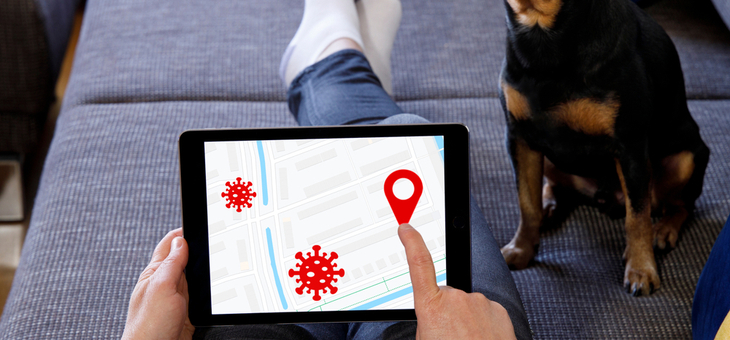As Australia moves closer to its 80 per cent fully vaccinated target, the time for stranded Aussies to return home is approaching. However, the method for bringing Australians home is raising some troubling privacy concerns.
Part of the process in opening Australia’s borders employs the use of home quarantine for returning travellers, instead of the more expensive hotel quarantine option.
South Australia took on responsibility for trialling the home quarantine system last month and is using a government-built app called home Quarantine SA.
Read: Is there a way to block political text messages?
The app supports compliance and enforcement of health rules by using geolocation and facial recognition software to confirm an individuals’ identity and location at various intervals while under home quarantine.
As the South Australian system has proved to be a success, NSW, Victoria and Tasmania have all announced that they will start testing similar systems.
However, both the Human Rights Law Centre and Digital Rights Watch have raised concerns with the technology and have written to federal, state and territory health ministers calling for stronger privacy protections.
Read: AstraZeneca drug shows success treating severe COVID
The joint letter acknowledges that technology will play an important role in the transition from hotel to home quarantine arrangements but urges the ministers to adopt strong safeguards against the misuse of personal information.
Samantha Floreani, from Digital Rights Watch, said any home quarantine app should have the same protections that were in place for the COVIDSafe app.
“Significant effort went into ensuring that the legislation governing the COVIDSafe app had a strong focus on privacy,” Ms Floreani said. “This should be the baseline for any technological approach to managing the public health response to COVID-19.
Read: COVID-safe costs for business mean higher prices
“The information collected by the home quarantine app, as well as that collected via QR ‘check ins’, is no less sensitive to that which was to be collected by the COVIDSafe app,” she said.
“Individuals should be able to trust that the personal information they are providing will only be used to support the public health response to COVID-19, and nothing else.”
The letter warns that there have already been cases of law enforcement authorities seeking to access QR ‘check in’ data, which undermines community trust in the system.
It says that without robust protections in place, the information collected by home quarantine apps could later be used for secondary purposes in similar ways.
“As we move into the next phase of the pandemic, Australians will not be in a position to make meaningful choices about whether or not they provide personal information in home quarantine,” Ms Floreani said.
“Australian governments must ensure the data they collect during home quarantine is retained for no longer than necessary and is not misused or disclosed for non-health-related purposes.”
Kieran Pender, a senior lawyer for the Human Rights Law Centre, said that facial recognition technology carries significant human rights and privacy risks and that any apps that used these features needed to be subject to proper safeguards and transparency.
“There must be a clear ban on any of the data collected being used for any other purpose beyond public health compliance,” Mr Pender said.
Leading authorities including the Australian Human Rights Commission and the UN High Commissioner for Human Rights have recently called for a moratorium on the use of facial recognition technology until there are appropriate regulatory frameworks in place.
The joint letter calls on the ministers to commit to enacting such regulation.
“As an interim measure, home quarantine apps should perform identity and location-checking ‘in-app’, rather than transferring sensitive biometric data to an external, centralised database – as is currently occurring in home quarantine trials,” Mr Pender said.
“That would be a more secure approach that would still permit the necessary verification to take place.”
Are you worried that governments will use COVID technology to track citizens in future? Should there be greater protections in place for facial recognition technology? Why not share your thoughts in the comments section below?
If you enjoy our content, don’t keep it to yourself. Share our free eNews with your friends and encourage them to sign up.

